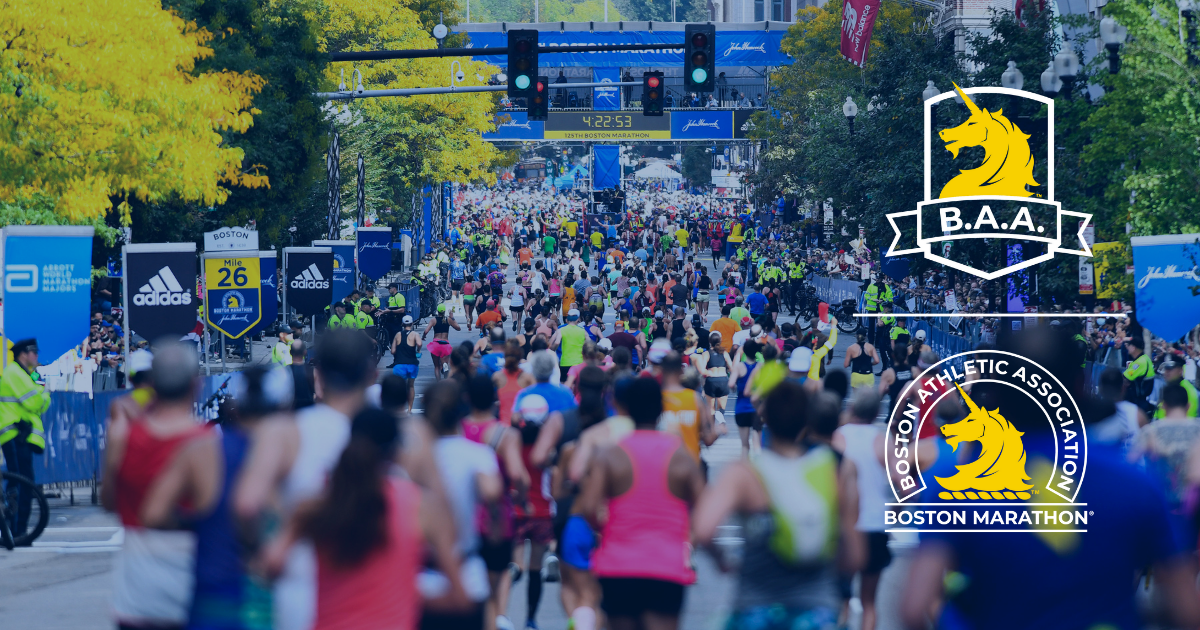Hello runner friends!
Welcome back to the Bass Pro Fitness Series
MIDWEEK M😊TIVATI😊N blog!
Now let's get started by talking about what took place on Monday... the Boston Marathon! As someone who's had the blessing of running this world-renowned race three times, I can tell you that I felt and understood the deep emotion behind the smiles on the runners faces as they crossed the iconic finish line located at 655 Boylston Street. The 26.2 mile distance they had just covered was a feat for sure, but it paled in comparison to the number of miles each one of them logged in training just to qualify, much less prepare for Marathon Monday. It's no wonder then that they were all beaming! All the work they had put in to be granted the honor of stepping up to the start line on historic Main Street in Hopkinton, Massachusetts had paid off!
And while every runner has his or her own story of how they qualified, Boston Qualifiers, or BQers, share a few training commonalities that every runner who's looking to get faster (not necessarily to snag a BQ time but to PR at their next half marathon, trail run or full marathon) can benefit from. According to an article posted in Runner's World a while back, Strava mined its users’ data to compare the training habits of 7,164 marathoners who ran a Boston qualifying time versus 24,330 marathoners who didn’t qualify. (Of course, not everyone who trains for and runs a marathon is gunning for a BQ.) The data set analyzed runs submitted to Strava in the 12 weeks prior to a user’s marathon. After crunching the numbers based on users’ ages and necessary qualifying times, Strava was able to pinpoint several factors that helped people run a BQ time.
And without further ado, here are the six that stood out (*with my two cents thrown in of course):
1. BQers run more miles
This shouldn’t be that surprising. The more you run, often the faster your marathon time will be. But the difference in mileage between BQers and non-qualifiers is quite staggering.
According to Strava’s data, in the 12 weeks leading up to a marathon, male BQers ran almost twice as many miles than male non-qualifiers. During the cycle, the average male qualifier ran just below 560 total miles. The average male non-qualifier completed just below 300 miles.
The results are similar for females: BQers completed roughly 480 total miles during training while non-qualifiers completed about 282 miles.
Average peak mileage for all runners came three weeks out from their marathon, but again there was a gap. Male and female BQers (59.67 and 54.03 miles, respectively) hit a much higher point for weekly mileage than male and female non-BQers (42.84 and 40.06).
*If you're looking to snag a PR on a half-marathon or shorter race, you'll want to take the numbers into consideration and adjust accordingly. Also, don't ignore the 10% rule and other factors that should be considered when deciding when to add mileage and what type of miles to add (hills, speed, etc.). Stressing the body too quickly can lead to injuries and the need to take time off.
For both men and women, the numbers show that BQ runners squeeze in nearly two more runs per week than those who didn’t qualify. Male qualifiers logged the most runs per week, averaging 7.05 runs in seven days. Women qualifiers averaged 6.70 runs per week.
*Keep in mind that the number of rest days a person needs varies based on several factors. But, generally speaking, every runner should aim for at least one full day of rest each week.
3. BQers run at different times
If you hate training in the morning, rejoice! Strava found no significant difference between BQers and non-qualifiers in terms of what time of day they logged miles.
However, the findings did discover that women in general (whether they qualified or not) tend to run more in the morning than the afternoon. Roughly 57 (non-BQ) to 60 (BQ) percent of the female runners analyzed went on runs before noon.
Men, on the other hand, were split nearly 50/50 on morning versus evening runs, regardless of whether or not they earned the BQ.
4. BQers know when to take it easy
Male qualifiers ran 15 percent of their training runs at marathon pace or faster. For the other 85 percent of their miles, they ran slower than the qualifying standard pace, signaling that they only cranked up the effort for important workouts. In comparison, male non-qualifiers may be going too hard, too often. Fifty-seven percent of their runs were done at their BQ marathon pace or faster. It was a similar story for women. Twenty-three percent of training runs by BQers were completed at marathon pace or faster versus 64 percent of runs at marathon pace by non-qualifiers.
These findings support a golden standard of marathon training: easy runs should be easy, and hard runs should actually be hard.
*Like BQers, we can all benefit from adding variety into our running and doing the routines as prescribed. Doing the same ole, same ole runs day after day can not only rob us of motivation as it can become boring and mundane, but we aren't unlocking our full potential by staying in the same place! Add in some tempo runs, some fartleks, and some interval runs (among others) and see if you're not getting better! And smiling while you're doing it as well. It's fun to mix up the runs! And don't forget about those hill repeats. They are so underrated when it comes to building strength, stamina, and mental staying power.
Though BQers tend to vary their pace significantly more than non-qualifiers (see insight No. 4), their average pace per mile over the 12-week training cycle was still significantly faster than non-qualifiers.
Men who earned their ticket to Hopkinton averaged about a 7:45 minute-per-mile pace across all of their training runs. Women BQers averaged about an 8:30 pace.
That is compared to about an 8:50 average pace for non-qualifying men and a 9:50 pace for non-qualifying women.
*Remember that you're only competing against yourself. Just as BQers strive to get faster and better, incorporating different types of runs and strategies, the average runner should to. It gives us a goal to work for and this new purpose can help to keep us motivated to lace up day after day! The takeaway is to take your current pace (whether that's a 10, 11, 12, 13, or 14 minute mile) and work to get a little faster each week. I've actually been doing this for the past few months and have really enjoyed pushing myself. I may never run Boston again but that's ok! Being better than I was yesterday is a goal that I can reach. We all can!!
Strava was also able to track how many photos each user posted after runs, finding that on average (for both men and women) those who earned a qualifying time posted photos about 30 percent less than their non-qualifying counterparts.
The company does note, however, that BQers of both genders have nearly double the amount of followers on their Strava than those who did not qualify. Maybe having others watching your training gives you an extra push? Female BQers had 89 followers versus 41 for non-BQers, and male qualifiers had 81 followers compared to 45 for those who didn’t qualify.
*This goes back to having an accountability partner to give you an extra push. While I don't have a Strava account or people that "follow" me, I do have several close friends that I confide in. I tell them my goals and they ask me about my progress periodically and cheer me on. This is super important when you have a goal that you want to reach.
So there you have it friends. There are a lot of things we can learn from the dedicated runners that make it their goal to qualify for the most famous marathon in history every year. But the biggest takeaway is this.... it takes hard work to achieve any lofty goal we set for ourselves, whether it’s to complete a 5k, 10k, half marathon, or any other distance. It takes dedication, discipline, and time. But you can bet it's all worth it when we cross that finish line! So choose your goal and make it happen!
Happy Running!








No comments:
Post a Comment